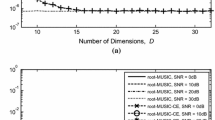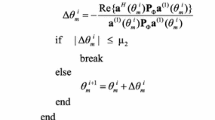Abstract
This paper deals with blind residual carrier frequency offset (CFO) and timing offset (TO) estimation based on minimum output variance (MOV) criterion without devoting training sequence and pilot symbol for uplink multicarrier-code division multiple access (MC-CDMA) systems. It has been shown that the performance of MOV estimator is degraded because the effect of noise and wideband spread-spectrum signals. In conjunction with spreading code-aided and subspace projection techniques, we present an improved code-aided MOV (ICMOV) estimator to achieve the high accuracy estimate for the noisy case. Due to more accuracy residual CFO estimate can provide more accuracy residual TO estimate, this paper also present a decision-directed ICMOV (DD-ICMOV) approach to improve the estimation performance of ICMOV estimator. Computer simulations are provided for illustrating the effectiveness of the proposed approaches.
Similar content being viewed by others
References
Wang Z., Giannakis G. B. (2000) Wireless multicarrier communications. IEEE Signal Processing Magazine 17(3): 29–48
Jang W. M., Nguyen L., Lee M. W. (2008) MAI and ICI of asynchronous uplink MC-CDMA with frequency offset. IEEE Transactions on Vehicular Technology 57(4): 2164–2179
Wang X., Tjhung T. T. (2003) SER performance evaluation and optimization of OFDM system with residual frequency and timing offsets from imperfect synchronization. IEEE Transactions on Broadcasting 49(2): 170–177
Pollet T., Van Bladel M., Meneclaey M. (1995) BER sensitivity of OFDM systems to carrier frequency offset and Wiener phase noise. IEEE Transactions on Communications 43(2): 191–193
Minn H., Bhargava V. K., Letaief K. B. (2003) A robust timing and frequency synchronization for OFDM systems. IEEE Transactions on Wireless Communications 2(4): 822–839
Deng J. H., Lin T. T., Liao S. M. (2012) A fuzzy MOE receiver for uplink MC-CDMA systems with carrier frequency offset over multipath fading channels. Wireless Personal Communications 65: 537–553
Van de Beek J. J., Sandel M., Borjesson P. O. (1997) ML estimation of time and frequency offset in OFDM systems. IEEE Transactions on Signal Processing 45(7): 1800–1805
Liu H., Tureli U. (1998) A high-efficiency carrier estimator for OFDM communications. IEEE Communications Letters 2(4): 104–106
Chen B., Wang H. (2002) Maximum likelihood estimation of OFDM carrier frequency offset. IEEE International Conference on Communications 1: 49–53
Tureli U., Liu H., Zoltowski M. D. (2000) OFDM blind carrier offset estimation: ESPRIT. IEEE Transactions on Communications 48(9): 1459–1461
Sameer S. M., Raja Kumar R. V. (2011) An efficient maximum likelihood carrier frequency offset estimator for OFDM using null subcarriers and cyclic prefix. Wireless Personal Communications 58: 259–279
Yang W., Liu J., Xu C., Cheng S. (2012) Joint carrier frequency offset estimation and compensation for downlink group-orthogonal multicarrier CDMA. Wireless Personal Communications 62: 107–116
Yang F., Li K. H., The K. C. (2004) A carrier frequency offset estimator with minimum output variance for OFDM systems. IEEE Communications Letters 8(11): 677–679
Huang C. C., Su I. J., Chang A. C. (2006) Blind estimation of MC-CDMA carrier frequency offset. IEICE Transactions on Communications E89-B(9): 2646–2651
Salari S., Ardebilipour M., Ahmadian M. (2008) Joint maximum-likelihood frequency offset and channel estimation for multiple-input multiple-output-orthogonal frequency-division multiplexing systems. IET Communications 2(8): 1069–1076
Salari, S., Ardebilipour, M., Ahmadian, M., Meghdadi, V., & Cances, J. P. (2007). EM-based joint ML estimation of carrier frequency offset and channel coefficients in MIMO-OFDM systems. In IEEE 18th international symposium on personal, indoor and mobile radio communications (PIMRC), pp. 1–5.
Tonello, A. M., Lanrenti, N. & Pupolin, S. (2000). Analysis of the uplink of an asynchronous multiuser DMT OFDMA system impaired by time offsets, frequency offsets, and multipath fading. In Proceedings of the vehicular technology, Vol. 3, pp. 1094–1099.
Morelli M., Kuo C. C. J., Pun M.N. (2007) Synchronization techniques for orthogonal frequency division multiple access (OFDMA): A tutorial review. Proceedings of the IEEE 95(7): 1394–1427
Chang A. C., Chen S. W. (2009) Blind carrier frequency offset estimation using an improved minimum output variance approach for synchronous MC-CDMA systems. Journal of Informatics and Electronics 3(2): 31–35
Chang A. C. (2006) Adaptive DOA tracking approaches for time-space system in a CDMA mobile environment. IEICE Transactions on Communications E89-B(8): 2208–2217
Hsieh H. D., Wu W. R. (2009) Maximum likelihood timing and carrier frequency offset estimation for OFDM systems with periodic preambles. IEEE Transactions on Vehicular Technology 58(8): 4224–4237
Nguyen H. C., de Carvalho E., Prasad R. (2010) Joint estimation of the timing and frequency offset for uplink OFDMA. Wireless Personal Communications 52: 119–131
Thiagarajan L. B., Attallah S., Abed-Meraim K., Liang Y. C., Fu H. (2008) Non-data-aided joint carrier frequency offset and channel estimator for uplink MC-CDMA systems. IEEE Transactions on Signal Processing 56(9): 4398–4408
Horn R. A., Johnson C. R. (1985) Matrix analysis. Cambridge University Press, Cambridge, UK
Author information
Authors and Affiliations
Corresponding author
Rights and permissions
About this article
Cite this article
Chang, AC. Blind Residual Carrier Frequency Offset and Timing Offset Estimation Using Improved Minimum Output Variance Approaches in Uplink MC-CDMA Systems. Wireless Pers Commun 71, 2231–2246 (2013). https://doi.org/10.1007/s11277-012-0933-7
Published:
Issue Date:
DOI: https://doi.org/10.1007/s11277-012-0933-7




